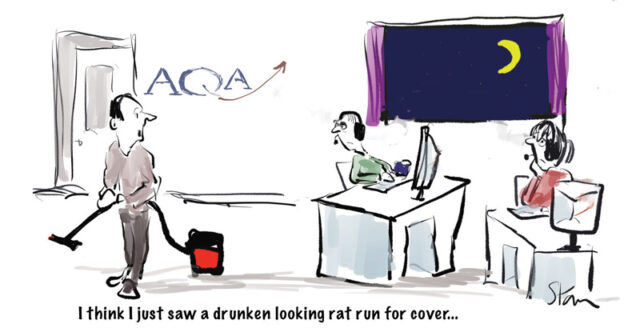What do drunk rats, teenage boys and an independent drugs company have in common? Despite sounding like key components from a song in the 1980s they are actually items mentioned in AQA’s biology GCSE paper taken earlier this week.
Echoing youngsters across generations who walked out of exams and asked “what the heck was all that about”, the year 11s on this one did likewise – only this time they had smartphones, and Facebook.
A pupil called Jack from East Yorkshire reportedly said he didn’t “have a clue” what the questions had to do with biology and he rang the exam board to complain. “It’s stuff that we’ve never been taught, and that’s not the teachers’ fault, it’s the exam board’s fault, because they didn’t tell the teachers to teach us it.”
This trend for pupils to panic about exams post haste and in online forums, as well as calling exam boards to demand action against difficulty, has gathered pace of late and it’s a problem. First, it means young people are spending more time ruminating over answers already missed than they are revising for the next day’s exams.
I was disturbed to see the founder of online forum Student Room say that after the AQA biology exam a record number of young people took to its pages to discuss the incident. Sharing worries is fine, but there were several exams spread over the next days. Why weren’t they revising instead of hissing over things that can’t be changed?
Second, while most young people sit exams at the same time, there are some cases where time conflicts mean pupils sit tests the next day. Although kept in a controlled environment overnight, this hasn’t usually required an entire media blackout – including radio and tv – but in a world where exam questions beget media hysteria, the likelihood is that questions may eke out.

Last year’s “Hannah’s sweets” incident seems to have been the watershed moment for such behaviour. In a maths GCSE paper set by exam board Pearson, pupils were asked the following:
There are n sweets in a bag. Six of the sweets are orange. The rest of the sweets are yellow.
Hannah takes a random sweet from the bag. She eats the sweet.
Hannah then takes at random another sweet from the bag. She eats the sweet.
The probability that Hannah eats two orange sweets is 1/3.
Show that n² – n – 90 = 0.
That last line seems to come from nowhere. One minute we’re imagining the joy of Hannah eating a jellied fried egg and a bon-bon, the next she’s being whacked with an alien-looking equation. Indeed, it reminds me of the time I told a pupil she must remove her feet from a chair only to have her reply that I was ugly. Our two sentences were both plausible: but it didn’t mean one followed from the other.
Online hell broke loose after the sweets incident, with people ringing Pearson to complain and pupils ranting on social media. The national media ran comments, and news articles, and radio shows hosted phone-ins. Everyone feeling the stress of exams got cathartic release and the world moved on.
Or did it? The AQA biology exam is the first of this year’s GCSE furores, but it won’t be the only paper with a difficult question and, eventually, at least one exam will have an error in it – at which point I half expect the internet to melt along with the unfortunate exam body’s phone lines.
Critics will point to these exam issues as proof our testing systems have “gone mad”. Exam boards are sloppy, the government is reforming qualifications too quickly, it’s unfair that pupils have to sit tests. Those will be the arguments.
Actually, what hard questions show is that the paper is challenging the full ability range, while errors show that humans were involved in the process and none of us is perfect.
Such sympathy is fine for you, people will say, but what about the pupils who get shafted by bad examinations?
Thing is: pupils don’t get shafted by the exams. If a question is so hard no one can answer it, or an error makes a question impossible, then grade boundaries will be moved to account for that.
Really the only damaging consequence of a cacophony over difficult exams is the stress it puts on pupils who are already worrying as they eat their breakfast, and now face amplified concerns in forums and social media.
It is fun for adults to try, and fail, to answer questions about Hannah’s sweets or the blood alcohol level of rats. For 16-year-olds these things affect their futures. We need to treat the questions with gravitas, while also reminding pupils that looking forward, rather than moaning about the past, is the best way for them to achieve.








My understanding is that there were two complaints in particular about the AQA GCSE Biology Higher Tier Unit 1 paper:
First, The candidates were asked about an ‘independent company’ which spooked some into thinking this required a business studies answer rather than saying that independent meant impartial;
Not too serious, that one. But the second complaint was about a question which appeared to require no biological knowledge. I haven’t seen the paper so I’m relying on the description given to me by a candidate. It appeared a table listed teenagers’ preferences for alcoholic drinks. The question which followed appeared to ask students to use the data to disprove a statement like, ‘All boys like alcohol’.
This could be answered by anyone who could analyse data. It didn’t need any biological knowledge. It didn’t need experience of scientific analysis. There is no value in asking questions on a test paper which don’t require any knowledge of the subject being tested.
Not just students. A school in Northern Ireland is going to complain to AQA about it. http://www.bbc.co.uk/news/uk-northern-ireland-36326734
Yesterday’s AQA Chemistry paper didn’t result in a Twitter storm. My source and her fellow candidates were much happier.
My son checked the cover of his GCSE biology paper twice during the exam as he thought he must have been given the wrong paper by mistake. So did his friend and so, according to,social media, did other students. It wasn’t that the exam was hard, it was that it was odd and lacked opportunities to show off the biological knowledge they had been learning. He felt short changed. He’s really good at maths so being asked to do lots of data analysis wasn’t hard for him. If anything it made the paper easier for him. But he wanted to be tested on the biology he had worked hard to learn- or at least some of it.
I am very much with Laura McInerney on this. The English education system is blighted by teaching to the test. In my view all GCSE exams should contain questions that their teacher could not possibly have prepared them for. This is what PISA attempts to do and quite right too. It is the only way to test deep understanding. If this was to be the case then all the escalating damage to our pupils and the continuing degradadation of our education system caused by academisation and marketisation would rapidly be halted. The Global Education Reform Movement (GERM) would have to be be rapidly abandoned.
On this I am completely at odds with your contributor Janet Downs (which is unusual as we agree on most things). This has resulted in an extensive debate on the Local Schools Network website, which you can find here.
http://www.localschoolsnetwork.org.uk/2016/05/students-take-to-twitter-to-express-anger-about-gcse-biology-paper
The quality of exam questions cannot be judged from the reactions of students on Twitter on finding that their cramming and revision has been in vain. The purpose of schooling is not to enable the maximum number of students to pass the maximum number of exams, but to produce cleverer, wiser and more creative school leavers who can apply their knowledge in the unpredictable and challenging future that faces us all.
Almost every year, there is some form of complaint regarding biology exams, Whether it be at GCSE or AS/A-level. As far as I can see, complaints are unfounded. Papers test the abilities of various calibre students and not every question is meant to be answered correctly by everyone. Also, data, figures and clues in questions shed light on how to go about solving ‘tricky’ problems. Students are often thrown off when a seemingly novel scenario or theme is presented as part of a problem. The problem can be solved without any external subject knowledge.The animal etc. (just an example) that is part of a question is just to throw off ‘average’ students and no esoteric knowledge is required to solve the problem. Common sense, composure, good understanding and ability to apply previous knowledge is being tested. Many students do not seem to understand that not all papers need to be representative of the majority of sections covered in their course. It is infeasible to cover bits from every section year-on-year. If one section seems to be tested more rigorously, tough luck. People study various parts to different extents (some people are more lucky). To dismiss a small section in your biology guide as trivial and not requiring much learning is your mistake. Exam boards do not need to give away chunky marks on what seems to be a topic covered in great depth to reward efforts or satisfy egos. Furthermore, students fail to appreciate that studying is about learning and understanding. Just because e.g. auxins were not tested, doesn’t mean that you wasted time studying. I understand that everyone wants to pass and do well (some may not even need biology for a later career choice) but these complaints are becoming ridiculous in biology. The ‘independent company’ question was common sense and relevant because science focuses on bias and reliable sources. To question whether it was right to have a question about 15 year adolescents drinking is also preposterous. It was a simple data-based question. During an exam, you should focus on the problem at hand rather than being preoccupied by ethical scrutiny. With exam boards introducing new grades and also changing syllabi people seem to think that exams are becoming ‘harder’. Education now is being tailored about passing exams rather than learning and is mainly about rote learning. Students do not care about learning (my opinion), most just care about passing. Finally, grade boundaries get adjusted to reflect national performance. People need to calm down and the media just blows things out of proportion.